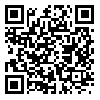Volume 28 - Supplementary
IBJ 2024, 28 - Supplementary: 346-346 |
Back to browse issues page
Download citation:
BibTeX | RIS | EndNote | Medlars | ProCite | Reference Manager | RefWorks
Send citation to:



BibTeX | RIS | EndNote | Medlars | ProCite | Reference Manager | RefWorks
Send citation to:
Norouzi S, Mafi M H, YekeFallah L. Effective Role of Family Support in Managing Hypoglycemia Fear Among Patients with Type2 Diabetes Patients. IBJ 2024; 28 :346-346
URL: http://ibj.pasteur.ac.ir/article-1-4783-en.html
URL: http://ibj.pasteur.ac.ir/article-1-4783-en.html
Abstract:
Introduction: Family members can provide practical assistance in the daily management of diabetes for adults with the condition, supporting and encouraging them to adhere to their treatment plans. Positive family involvement can significantly aid in controlling the disease and its associated complications. This study aimed to examine the relationship between family support and fear of hypoglycemia in patients with Type 2 diabetes.
Methods and Materials: In this cross-sectional descriptive study, 250 patients with Type 2 diabetes visited the Diabetes Clinic of the Velayat Hospital of Qazvin City. The data was collected with an individual social information checklist, the hypoglycemia fear questionnaire, and the Shefer Diabetes Specific Family Support scale. Descriptive and descriptive statistics (multiple linear regression model and Spearman correlation coefficient) and SPSS software version 24 were used to analyze data.
Results: The average age and duration of the participants ' disease was 62.80 ± 12.505 and 12.96 ± 5.46 years. The majority of the participants (58%) were female genders. The mean and standard deviation of the hypoglycemic fear score was 36.50 ± 12.77 (score 0 to 72). Also, the supporting family behaviors score was 26.28 ± 6.95 (score 9 to 45) and the supporting family behaviors were 27.88 ± 3.27 (7 to 35). According to the Spearman correlation coefficient test, there was a significant correlation between fear of hypoglycemia with supportive family behaviors (p = 0.001; r=-0.519) and non-supportive family behaviors (p = 0.001; r = 0.217). The results of multiple linear regression showed that supportive family behaviors (p = 0.001; B = -0.433), non-supportive family behaviors (p = 0.018; B = 0.459), fasting blood sugar (p = 0.001; B = 0.042), glycosylated hemoglobin (p = 0.001; B = -0.433), and having underlying diseases (p = 0.011; B = 0.459) was identified as predictors of fear of hypoglycemia.
Conclusion and Discussion: The findings showed a direct relationship between hypoglycemic fear and non-supportive family behaviors and an inverse relationship between hypoglycemic fear and supportive family behaviors. Family support can play an important role in reducing the complication of fear of hypoglycemia. Developing family education to effectively and positively support a person with diabetes is essential to reducing the complications of diabetes, which healthcare providers could include in their education programs.

Methods and Materials: In this cross-sectional descriptive study, 250 patients with Type 2 diabetes visited the Diabetes Clinic of the Velayat Hospital of Qazvin City. The data was collected with an individual social information checklist, the hypoglycemia fear questionnaire, and the Shefer Diabetes Specific Family Support scale. Descriptive and descriptive statistics (multiple linear regression model and Spearman correlation coefficient) and SPSS software version 24 were used to analyze data.
Results: The average age and duration of the participants ' disease was 62.80 ± 12.505 and 12.96 ± 5.46 years. The majority of the participants (58%) were female genders. The mean and standard deviation of the hypoglycemic fear score was 36.50 ± 12.77 (score 0 to 72). Also, the supporting family behaviors score was 26.28 ± 6.95 (score 9 to 45) and the supporting family behaviors were 27.88 ± 3.27 (7 to 35). According to the Spearman correlation coefficient test, there was a significant correlation between fear of hypoglycemia with supportive family behaviors (p = 0.001; r=-0.519) and non-supportive family behaviors (p = 0.001; r = 0.217). The results of multiple linear regression showed that supportive family behaviors (p = 0.001; B = -0.433), non-supportive family behaviors (p = 0.018; B = 0.459), fasting blood sugar (p = 0.001; B = 0.042), glycosylated hemoglobin (p = 0.001; B = -0.433), and having underlying diseases (p = 0.011; B = 0.459) was identified as predictors of fear of hypoglycemia.
Conclusion and Discussion: The findings showed a direct relationship between hypoglycemic fear and non-supportive family behaviors and an inverse relationship between hypoglycemic fear and supportive family behaviors. Family support can play an important role in reducing the complication of fear of hypoglycemia. Developing family education to effectively and positively support a person with diabetes is essential to reducing the complications of diabetes, which healthcare providers could include in their education programs.

| Rights and permissions | |
 |
This work is licensed under a Creative Commons Attribution-NonCommercial 4.0 International License. |







.png)
